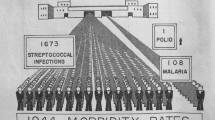
Overview
- Provides an in-depth analysis of the history and circulation of penicillin in Spain
- Brings together scientific, medical, social, political and industrial histories
- Considers the circulation of penicillin and other antibiotics in terms of scientific exchange, industrial production and social perception
- Includes supplementary material: sn.pub/extras
Part of the book series: Medicine and Biomedical Sciences in Modern History (MBSMH)
Access this book
Tax calculation will be finalised at checkout
Other ways to access
About this book
This book reconstructs the early circulation of penicillin in Spain, a country exhausted by civil war (1936–1939), and oppressed by Franco’s dictatorship. Embedded in the post-war recovery, penicillin’s voyages through time and across geographies – professional, political and social – were both material and symbolic. This powerful antimicrobial captivated the imagination of the general public, medical practice, science and industry, creating high expectations among patients, who at times experienced little or no effect. Penicillin’s lack of efficacy against some microbes fueled the search for new wonder drugs and sustained a decades-long research agenda built on the post-war concept of development through scientific and technological achievements. This historical reconstruction of the social life of penicillin between the 1940s and 1980s – through the dictatorship to democratic transition – explores political, public, medical, experimental and gender issues, and the rise of antibiotic resistance.
Similar content being viewed by others
Keywords
Table of contents (9 chapters)
-
Front Matter
-
Back Matter
Reviews
“Marıá Jesús Santesmases’s innovative new book, The Circulation of Penicillin in Spain, stands at the crossroads of two recent historiographies: science and technology under fascism, and the history of drugs. … Santesmases interweaves a story of biomedical politics and political economy with an on-the-ground exploration of gender and labor in the Spanish drug industry.” (Angela N. H. Creager, Journal of the History of Biology, August, 2018)
“This is an excellent study on travelling concepts, material and practices that form the heart of modernity in the scientific culture that joins biology and medicine and pervades political, industrial, professional and popular domains. Focusing on Spain, as one of the national geographies which shared the process of knowing, making, using (and abusing) and firstly worship penicillin, it benefits from a dissective gaze to unravel the multiple layers of meaning associated to that scientific, therapeutic and symbolic object. Based on a thorough search in archives and the press, armed with a most pertinent critical bibliography and beautifully written the result is a magnificent work which illuminates the set of agents that participate in the circulation of penicillin and its significance for health, research and gender.” (Esteban Rodríguez-Ocaña, University of Granada, Spain)
“In this fast-paced account, Santesmases applies her detective-like archival skills to unearth the fascinatinghistory of penicillin – as miracle drug, research object, media phenomenon, commercial product, black market commodity, and global traveler – in post-war Spain. Marshalling the tools of science studies, gender analysis, and critical historiography, Santesmases brilliantly expands our understanding of the important role of antibiotics not only in the history of medicine and public health, but also in the political economy of Spain during Franco’s dictatorship and the subsequent transition to democracy.” (Elizabeth Siegel Watkins, University of California, San Francisco, USA)
Authors and Affiliations
About the author
María Jesús Santesmases is a Research Fellow in the Institute of Philosophy at the Consejo Superior de Investigaciones Científicas (CSIC), Madrid. She is a historian of biology and has published on the twentieth-century history of molecular biology and biochemistry, genetics, antibiotics and women scientists. She is co-editor with Teresa Ortiz-Gómez of Gendered Drugs and Medicine (2014), and with Edna Suárez of A Cell-Based Epistemology: New Historical Approaches to Human Genetics, a special issue of the journal, Historical Studies in the Natural Sciences (2015).
Bibliographic Information
Book Title: The Circulation of Penicillin in Spain
Book Subtitle: Health, Wealth and Authority
Authors: María Jesús Santesmases
Series Title: Medicine and Biomedical Sciences in Modern History
DOI: https://doi.org/10.1007/978-3-319-69718-5
Publisher: Palgrave Macmillan Cham
eBook Packages: History, History (R0)
Copyright Information: The Editor(s) (if applicable) and The Author(s) 2018
Hardcover ISBN: 978-3-319-69717-8Published: 02 February 2018
Softcover ISBN: 978-3-319-88829-3Published: 04 June 2019
eBook ISBN: 978-3-319-69718-5Published: 18 December 2017
Series ISSN: 2947-9142
Series E-ISSN: 2947-9150
Edition Number: 1
Number of Pages: XI, 239
Number of Illustrations: 8 b/w illustrations, 1 illustrations in colour
Topics: History of Science, History of Medicine, History of Modern Europe, Social History



